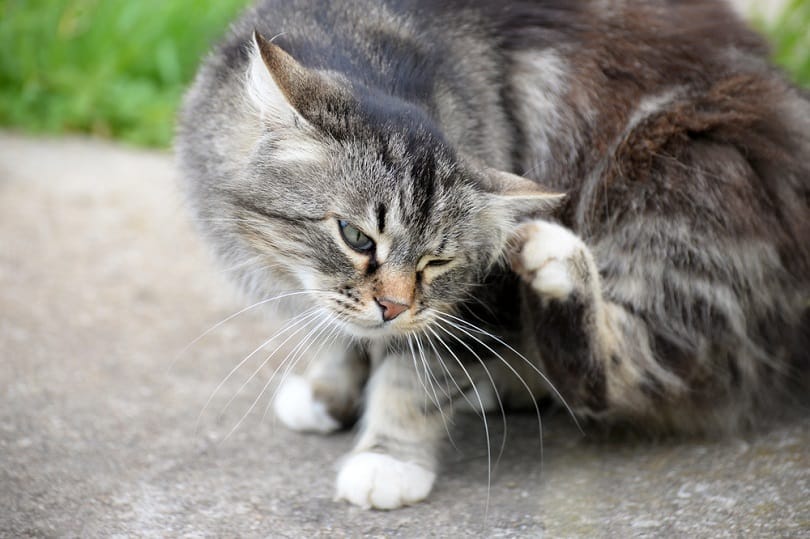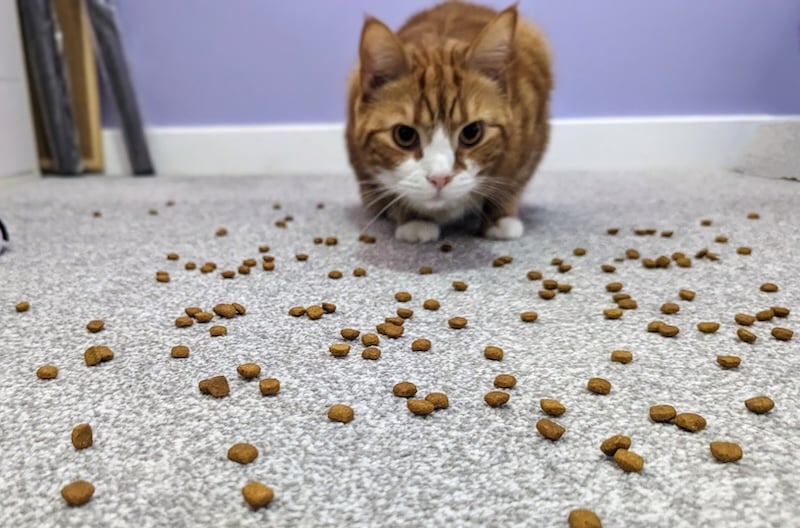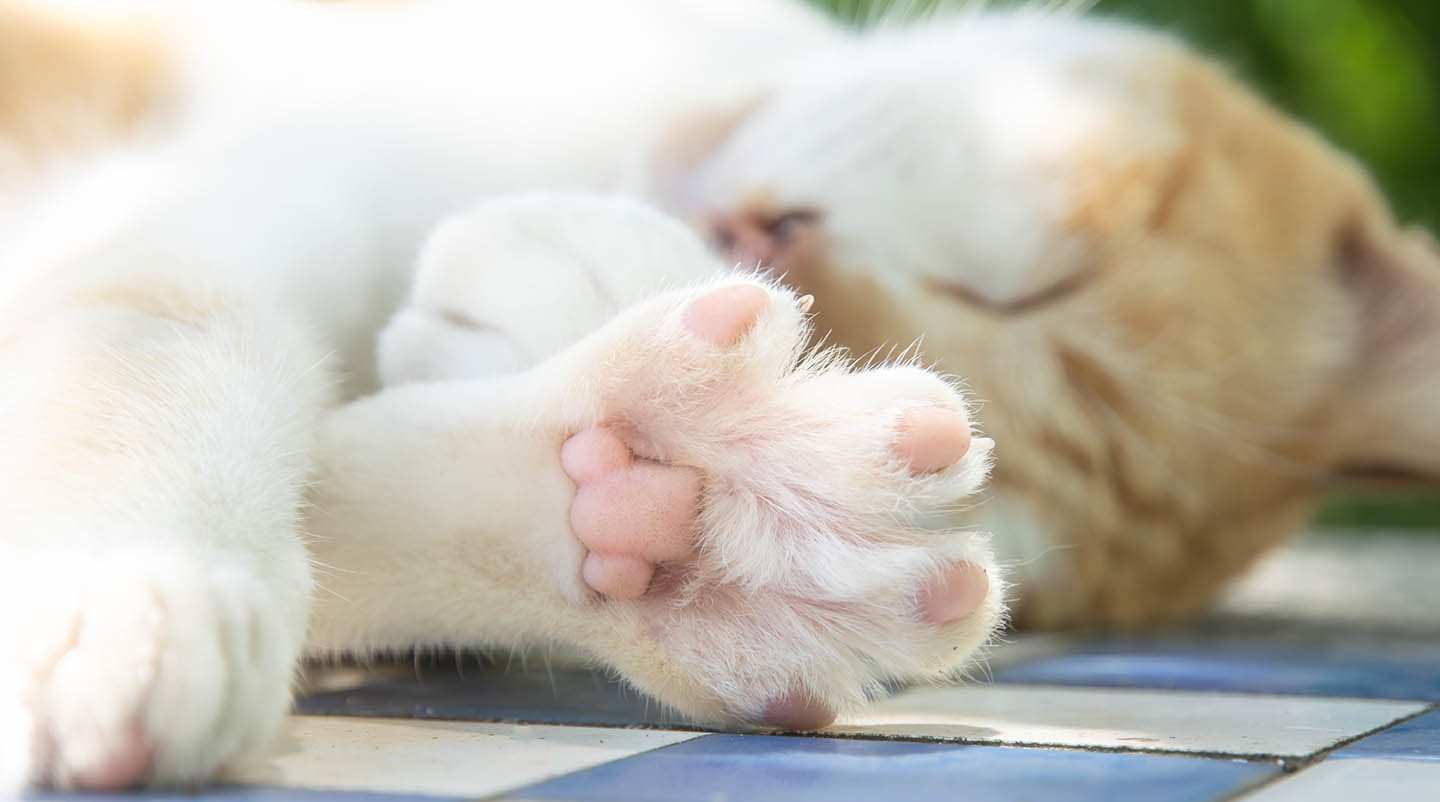Cats that have not received preventative treatment commonly contract worms, and although seeing the parasites in your cat’s vomit or stool is gross and concerning, they are typically easy to treat. If you’ve got a dog that recently had worms and have some leftover dewormer medication, it’s natural to wonder if you can use it for your cat too. Some types of dewormers are safe to give to both cats and dogs, but their dosages will differ. However, most dog dewormers aren’t suitable for cats, and vice versa. For this reason, it is recommended to never give dog dewormer to cats.
Before giving your cat a dewormer, chat with your vet first. Your cat should receive the dewormer that is best suited to their age, weight, and health condition. The medication should be given to your cat according to your vet’s instructions, which will differ from one pet to the other. Therefore, dewormers shouldn’t be shared between pets.

How Did My Cat Get Worms?
If your cat has worms, they’re not the exception, as most cats contract worms at some point over the course of their lives. Many kittens have worms because they are most vulnerable to parasites at such a young age. They can be born with them or get them from their mother’s milk.
Adult cats can also contract worms, which often happens by coming into contact with the parasite’s eggs by walking through a contaminated area, sharing a litter box with an infected cat, coming into contact with infected feces, or hunting and eating infected rodents. If a cat has walked through an infected area and those eggs or fecal particles get onto their coat or paws, they can ingest them when they lick and groom themselves.
Although some types of worms are species-specific, some can infect your cats and dogs. Your cat can become infected by coming into contact with your dog’s poop as well as their fleas. If a flea from a dog jumps onto your cat and hides in their coat and gets ingested while grooming, they can develop a tapeworm infestation.

Are Worms Dangerous to Cats?
There are many types of worms that can infect your cat. Some cats may not show any signs of having worms, while most will become sick. However, there are some types of worms that are life-threatening to cats. The severity of the worm infestation, as well as the health of a cat, can also play a role in how sick they will become.
Intestinal worms are most dangerous to kittens because they can cause developmental issues, anemia, and intestinal obstructions, depending on the type of worms they have. Some worms, such as heartworms, are a threat to cats of all ages because they can cause damage to a cat’s heart and lungs.
Below are different types of worms and how they can affect your cat:
- Roundworms: Can cause coughing, which can turn into pneumonia, vomiting, diarrhea, gas, an enlarged abdomen, weight loss, intestinal obstruction, and stunted growth.
- Hookworms: May cause anemia, eczema, skin lesions, coughing, diarrhea with blood, weight loss, and poor appetite.
- Whipworms: Can cause diarrhea with blood, weight loss, anemia, and dehydration.
- Tapeworms: Can cause stunted growth, intestinal blockage, and digestive upset.
- Lungworms: Can cause coughing, which can turn into pneumonia and difficulty breathing.
- Heartworms: Can cause coughing, rapid breathing, weight loss, vomiting, lethargy, seizures, and sudden death.

The Common Signs Among The Various Types of Worms
- The presence of worms: You will often be able to see the worms or parts of the worms in your cat’s stool or vomit. You may also notice worms around their anus area.
- A dull coat: Cats that are infested with worms often experience a change in their coat, where their once soft, silky, and shiny coat changes into a dull, dehydrated coat.
- Pale gums: Anemia can cause your cat’s gums to become pale in color, whereas a healthy cat’s gums will be pink.
- Digestive upset: Cats with worms will often vomit and have diarrhea, which can have blood in it.
- Weight loss: Although your cat might be eating more, they may still be losing weight.
If you notice any of these symptoms in your cat, it’s important to take them to the vet for an examination. Treatment is often straightforward, and the prognosis is typically good when treated early. However, if your cat doesn’t receive the care they need, they will suffer greatly, and it can even be fatal.

Can I Get Worms from My Cat?
If your cat has worms, it is possible that you or other members of your household may have contracted worms too. The most common way that humans get worms from their cats is by walking in or touching contaminated soil. Cats often poop outside in the soil and in sandboxes. If your child plays in their sandbox or you spend time gardening or walking around barefoot, you’re at risk for contracting worms.
The larvae in your cat’s poop can survive for a very long time, and the more an infected cat poops in your environment, the higher your risk of contracting worms. If you’ve dewormed your cat, you’re still at risk of contracting worms from another cat that may use your garden or sandbox to potty in. Remember to always wash your hands and feet when you’ve been gardening or walking barefoot outside.
How To Kill & Prevent Worms in Cats
The best way to protect your cat and yourself from contracting worms is by getting them dewormed from an early age and repeating the treatment as frequently as your veterinarian advises. Your kitten will be able to receive deworming treatment from around 6-8 weeks of age and will likely need to be dewormed at least twice.
As your kitten gets older, they won’t need to be dewormed as frequently, but we do recommend that you deworm your cat once every 1–3 months, especially if you allow them to roam outdoors or spend time with other cats and pets. Indoor cats without much exposure to the outdoors can safely be dewormed once every 3 months.
You can also lower your cat’s risk of contracting worms by starting them on flea and tick treatment, regularly cleaning and sanitizing their litter box, frequently changing out their old litter for new litter, and picking up the poop in the yard and sandbox with a shovel and discarding it properly.

Conclusion
Dog dewormers aren’t safe to use on cats because the dosage requirements are different. A cat will be given a dewormer that is suitable for their age, weight, and health condition. Worms can be passed through the feces or fleas of one infected cat to another, as well as from an infected dog. Worms can make a cat very sick, but with the correct treatment, they usually make a full recovery.
To prevent your cat from getting sick from worms, make sure to deworm them frequently. Outdoor cats should be dewormed around once a month, and indoor cats should be dewormed once every 3 months.
Featured Image Credit: Veera, Shutterstock






